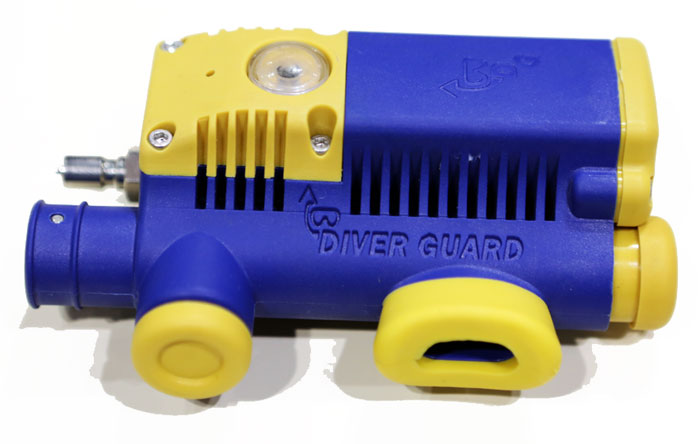Buoyancy control underwater is really quite basic – add air to your buoyancy compensator to become more buoyant; add weight or remove air from the BC to become negatively buoyant and sink. But what happens if you become unconscious underwater and unable to use your BC to ascend to the surface?
Diver Guard, a company from Israel, has introduced their solution – a new safety device for divers which will electronically monitor the diver’s breathing, alert the diver and his or her buddy if abnormal breathing occurs, and automatically add air to their BC and bring them to the surface if they become unconscious while underwater. It’s taken many years of research, testing, and development, and the new Diver Guard system is now being marketed to divers and distributors worldwide. The device was first shown at the annual DEMA show in 2012 as a prototype, and is now officially released and being sold through dive shops, distributors, and directly through their website.
The Diver Guard replaces the inflator unit on your BCD and has an oral and power inflation valve built in, and while diving provides the same function as a regular inflator unit. Inside the unit, however, is a microprocessor which monitors the diver’s breathing rate (or lack of breathing), and if the diver’s breathing becomes irregular, it sounds an audible alarm and flashing a small strobe which is mounted on the unit. If a diver stops breathing completely for 90 seconds, the Diver Guard automatically adds air to the BC, which naturally brings the diver to the surface.
Tina from Diver Guard explains the function of the Diver Guard in further detail (Click to watch):
The Diver Guard may be of special interest to divers who dive solo and would not have anyone to assist them if they lost consciousness underwater during a diver.
What about the dangers of an uncontrolled ascent while unconscious? Diver Guard points out, “A quick rise to the surface does endanger the diver, but if DiverGuard has initiated the automatic inflation mechanism, it means that the diver is in respiratory distress, and remaining underwater would pose a greater danger than rising quickly to the surface. The action of DiverGuard is comparable to the action of the airbag in a car: The airbag also causes damage to the passenger, but the damage prevented is much greater.”
The Diver Guard is powered by a user-replaceable 9-volt battery and retails for $299.
You can learn more from the Diver Guard website by clicking here.

